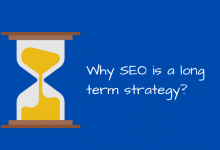How does blogging really affect your SEO?

You have probably heard (or read) that you should blog for your findability. Because “blogging is good for your SEO”. Should you start blogging, even if you can’t? Or if you don’t have the time or feel like it? Just because it’s good for your SEO? What is true about the statement that blogging is good for your SEO and what exactly should you do with it? how does blogging really affect SEO?
Table of Content
Blogging & SEO: what exactly is it?
Direct but the concrete answer: blogging is not guaranteed to affect your SEO. Blogging for findability in search engines is therefore not a decisive reason. What blogs help you be more visible in the search engines is another story. And I hear you ask: “But how many articles that appear in Google?” Let me help you straight away: if your blogs are not strong, it even has a negative effect on your SEO. And I will of course explain that to you down to the last detail.
Paper-thin content has a negative effect
Just like your website visitor, Google especially loves good content. When you write blogs purely for findability or for reasons other than adding value for the reader, it has a negative effect on your SEO. You then write thin or even wafer-thin content, and nobody wants that. Your website visitor does not, and therefore neither does Google. A short blog without adding value works more negatively than positively. The page will not meet the quality requirements and you will not get further in the search results.
Quality: Google’s ‘quality raters’
Google has about 10,000 quality raters who rate pages in the search results for quality. Based on the reviews of these quality raters, Google knows what is considered good quality pages and the search engine adjusts its algorithms based on this. Want to know what these people rate your web pages on? Then sit back and read this voluminous document with all the rules 😉
Blogging is good for findability
In the article ‘ 5 reasons to start blogging now,’ you could already read that blogging is good for your findability. In short, every page has content that you can rank for in the search engine. Whether or not you really ensure high positions in the search engines is another story. Blogging can certainly contribute to SEO, but findability is different from SEO.
Findability is different from SEO
There is a difference between findability and SEO. Findability only says that you can be found in the search engines. Whether that’s in the top 10, or page 2, 10, or 34 of Google, it doesn’t matter. You are findable. You can be found without doing anything about SEO. Sometimes even with some good positions in the search engines. If you seriously want to be found well, you will start optimizing your website and your content. So SEO. And blogs can contribute to that.
How blogging contributes to SEO
Your blogs can contribute to SEO in several ways:
- Every blog can rank high in Google because you make it the best article on a certain topic (see also point 5).
- In your blogs you can link internally to pages or other blogs on your website, which in turn gives those pages SEO value.
- Images in your articles can be shown in Google and thus drive traffic to your website.
- Regularly new content on your website encourages Google to come back regularly.
- Good articles, especially the best articles on certain topics, generate backlinks.
Such a summary is only a summary, so I will of course explain it well for each part.
1. Every blog can rank high in Google itself
Every blog article you write has a (main) topic. You can then “score” in the search engines. And that is not always necessary for search terms with a high search volume. If you rank with many long-tail keywords (keywords with low search volume) you can still bring many visitors. For example, you can see below how my blog about the call about “the municipal guide”, which is well-known to many entrepreneurs, yields 200+ visitors from Google in 1 month from 10 searches. In total, this article generated more than 600 visitors in that one month.
2. Linking internally in your blogs works for SEO
Links are an important part of SEO. This applies in particular to external links – the so-called backlinks -, but also to internal links to a lesser extent. With internal links, you also pass link juice to the web page you link to, which gives it more value in the eyes of Google. If you regularly link to a certain page on your website, it will build up more authority, which in turn can mean better positions in Google.
Internal linking is not done for SEO
I would like to make a note here that you do not create the internal links because of a possible SEO advantage. You do this mainly to help your reader further. You have probably noticed that I have linked a number of terms from the world of SEO to a page from my Glossary. This way you can easily find the explanation of those terms, for which I have also created the glossary especially for. That this provides some SEO advantage is nice, but not the reason for linking. That link should really add something for your visitor and take them to a page with more relevant information.
3. Images are also indexed
When you optimize your images well, they also become easier to find in the search engines. Thanks to Google Universal Search, you see more and more images in the search results. And with that, you can also get visitors to your website. In addition, the correct file names also contribute (something) to the findability of your page/article.
How images negatively impact your SEO
Images are not only positive for your SEO. For example, it is all too often that images are uploaded in high resolution. That is absolutely not necessary. An image does not have to be very large online and certainly not in high resolution. Large images slow down your website enormously because huge files have to be loaded. Technically optimizing your images is therefore also important.
4. Regularly new content: Google comes by more often
New content is not necessarily a direct SEO factor, but it does contribute in a positive way. If you publish new content on a daily, weekly, or monthly basis, Googlebot will visit your website with the same regularity. The search engine bot has then “learned” ( machine learning ) that there must be something new and comes to check it. In general, your entire website is included again, so that changes are included in the index.
The effects of regular new content
Because the search engine bot re-indexes, for example, new page titles and meta descriptions are displayed earlier, and the search engine reconsiders your positions more often. This can be positive, but also less positive. I generally don’t assume the latter. As long as you have good intentions and write good content for your visitor.
A nice example
During a conversation with a local real estate agent, I came across an address in the search results that I knew was not their office address. The real estate agent informed me that this was the address of a house that had gone on the market that same morning. Googlebot visits its website daily to pick up the new offer and uses it directly in the index. Purely because the real estate agency refreshes the offer daily.
5. Good articles earn their own backlinks
When you write good articles, people will eventually link to them. By writing the best blog you can write about any given article, you will ultimately earn your backlinks. And that is very good for your SEO. In the screenshot below you can see how a number of my articles have earned the necessary backlinks:
Delete old blogs
There is nothing wrong with deleting old/obsolete articles on your blog. Whether it really has (a positive) effect on your SEO is still a point of discussion. In any case, it is fine to take a critical look at the content of your own website or blog. If something is no longer current, why should it still be there? Does it not meet your current quality requirements, what does it still do on your website?
Or improve your articles
Items that can be done better must be better. I also regularly update articles. Or I go through them completely to improve them in every possible way. For example, I wrote my manual for keyword research in 2014 and updated it several times after that. And I have been doing that since 2018 with almost all articles on my website. Especially when I see that it can contain more, better, and/or more current information than it currently contains.
Yes, blogging takes a lot of time
Blogging takes time, a lot of time. I also don’t just throw a blog out of my sleeve. A little blog takes me 4 to even 8 hours. Real. It only gets me so much:
- Authority
- findability
- Customers
I sign for it.
Blogging is a marketing tool and marketing takes time and money. SEO is not a goal as far as I’m concerned. I’ve been writing most blogs purely on content since about mid-2014. Visibility is a nice side effect. And even in that circumstance, I am quite successful, dare I say 🙂
do you blog? Do you notice an SEO effect from that? Share your experiences about blogging and SEO or ask your question, I always respond.









